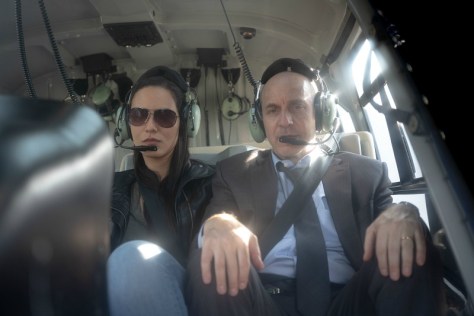It’s no secret that I loved Blackstone. Created by Ron E. Scott (above right), the APTN drama series was an unflinching look at life—and death—on a Canadian First Nations reservation. Violent, dramatic and unflinching, it was very much like The Sopranos in tone while its stories were about what life is really like on reservations.
Now Scott is back with a new series. Debuting Thursday at 9 p.m. ET on APTN, Tribal is more procedural but no less dramatic. Jessica Matten (above left)—last seen on Frontier—plays Samantha Woodburn, a First Nations woman who is teamed with big-city cop Chuck “Buke” Bukansky, played by Brian Markinson (Unspeakable, Continuum), to solve crimes on and off the reservation.
We spoke to writer, creator, director and executive producer Ron E. Scott about Tribal‘s beginning and where it goes in Season 1. At press time, APTN had announced a second season of Tribal had been ordered.
How did Tribal come about? Was this something you were developing while Blackstone was going on, or did you take some time off from Blackstone and then start working on this?
Ron E. Scott: As a content creator, I’m always developing projects. I had three or four projects that I was working on, and Tribal was one of them. You just don’t know what’s going to go. We’re just so thankful that APTN saw a lot of value in the project and saw that it was going to be great for their audience, so they went ahead and greenlit the show.
 Did anything change in the time between pitching APTN and them green-lighting it and then you heading into production?Â
Did anything change in the time between pitching APTN and them green-lighting it and then you heading into production?Â
RS: They definitely had some ideas of what they wanted to deliver to their audience. And so there were discussions and there was some back and forth. We shaped it for a certain demographic, a certain time zone, time period, which is always something that of a content creator goes into, your conception of what you’re delivering to your audience.
What is the tone like?Â
RS: Blackstone has its aggressive, confrontational, very kind of in your face. I think this is kind of a progression of North American native storytelling. This character has a lot of dimensions and it’s something that I don’t think we’ve seen before. In that way, I think it’s a progression. It’s not Blackstone and it’s not anything that’s really been out there. At the same time, it’s told with a Native American voice. Our lead is a Native American woman. I think the tricky part is we don’t know what to call Native People in America or Canada anymore. It’s Indigenous one week and it’s Aboriginal, First Nation.
So we’re running around, trying to figure this out, and I think that we deal with that a little bit in the show. It is a crime drama, so there’s a crime of the week, but it’s a character-driven crime drama. We’re driving characters forward and story and then we get into this really beautiful kind of arc and later in the season, where we’re starting to see a real crescendo of commentary from like I said, a Native American viewpoint.
Jessica Matten is your female lead.Â
RS: Whenever we create a story world where there’s a mashup between Tribal Police and the city police, a lot of people don’t understand that the jurisdictions of any Canadian reserve is held with the Canadian government. Technically, in the traditional days, the RCMP, which is the federal government, would have control over the reserves.
And so what happened is there have been hints of corruption. It hasn’t been sustained. It’s just allegations. And so the federal government comes and goes. In this day and age, this is not looking good for us, so we’re going to take over the Tribal police, but we’re going to remove the chief who is corrupt. Let’s say he is an old boys’ club kind of thing. It’s a very interesting kind of dynamic that unfolds. It’s a story world that I don’t know how far away it would be from reality because, in this day and age, there’s still some reserves that are being third-partied by the federal government. A lot of people don’t know this, but it’s a very interesting dynamic that unfolds. Let’s put forward the most politically correct candidates and let’s go from there, but we’re still in control, which is a big part of what the government does everywhere.
Talk about working with Brian Markinson.
RS: He’s just so talented and he was very impressed with the role. He loves the writing and so he was all over it. And I can’t say enough about him and Jessica. They create this collision on screen, but there’s a chemistry that is really interesting. I’m looking forward to hearing what people think about their chemistry, too, how it develops throughout the first season.
Has it been a bit of a learning curve for you then when you’re talking about filming a more procedural show?
RS: I definitely learned a lot on Season 1, and it’s just like when you’re flexing different muscles. It’s not like you’re learning a new sport. It’s just finding opportunities to kind of get in there and have a voice.
At the same time, we’re still trying to be aware that we’re creating a dynamic of characters. And so that’s not lost whatsoever. So I’m very proud of how these two characters navigate the season and they don’t always see eye to eye. We get a perspective from the Native and a non-Native perspective on both sides. There are always two sides presented.
That kind of collision, I think, is intelligent television. And I think that’s what I always strive for.
Tribal airs Thursdays at 9 p.m. ET on APTN.
Images courtesy of Prairie Dog Film + Television.















